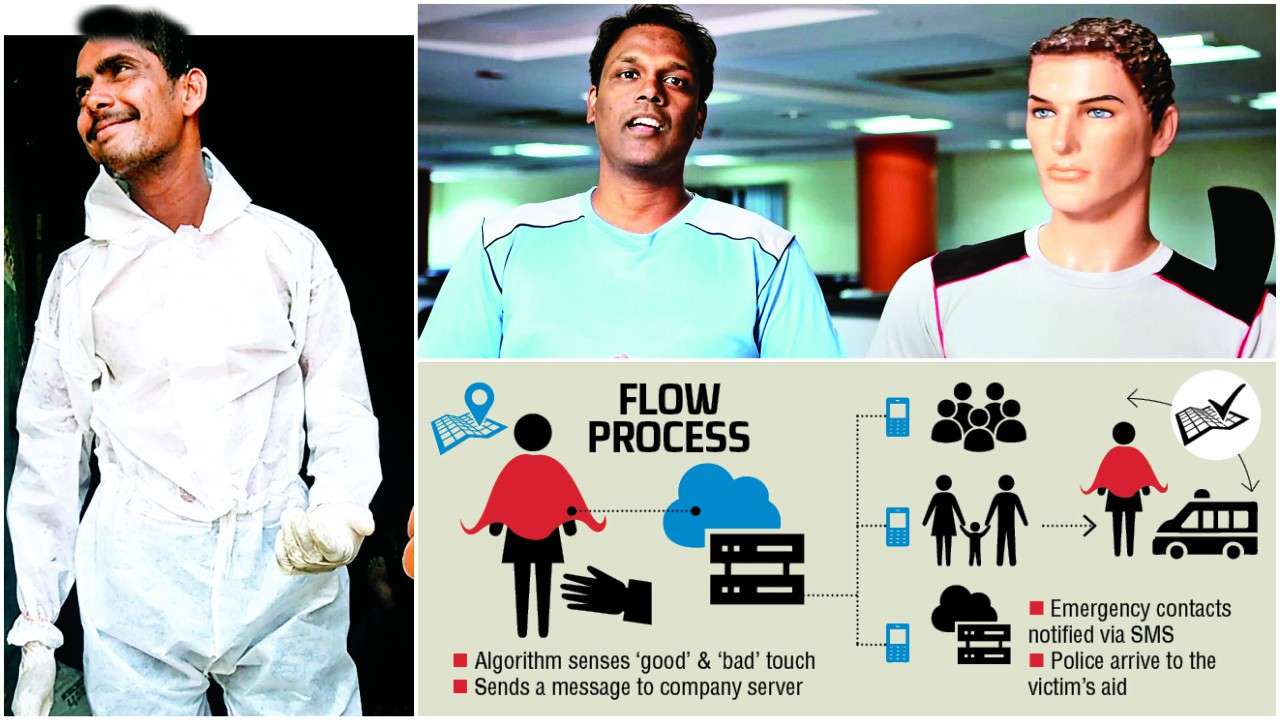
It was entirely chance that drew Amit Gupta's attention to the plight of manual scavengers in India. At the launch of Swachh Bharat Mission in 2014, a newspaper had juxtaposed an image of jhaadu-wielding MPs 'staging' a cleanliness drive, with one of manual scavengers working bare-bodied in filthy drains. "I saw that and wondered whether we couldn't do something about it," says 28-year-old Gupta, who was at the time doing a post graduation in fashion technology from Delhi's premier NiFT.
That thought was the starting point of a project that resulted in Gupta designing a hazmat suit specifically for manual scavengers in India.
Despite two legislations banning it, manual scavenging continues to be practised in India, found Gupta while he undertook a field study prior to working on the design. Manual scavengers, he found, were very lowly paid – as little as Rs 300/day – and often worked without protective gear. Skin infections from contamination by filthy sewage water, respiratory illnesses, accidents and even deaths were common. A hazmat suit for these workers, thus, had to be waterproof, light-weight, flexible, strong, biodegradable, and – most importantly — affordable.
In 2015, Gupta came up with a design that fit all the criteria. He zeroed in on a material – coated polypropylene spun bonded – that not just met the technical specifications, it was easily available and cost just Rs12 a metre. "The suits used in Western countries cost around $7,500 or nearly Rs 5 lakh. The prototype we've created costs just Rs 99," says Gupta with pride.
While the prototype of Gupta's design has been ready for two years, it isn't in use because he hasn't found a manufacturer, or a taker in the government.
Imagine a purse that changes colour with the clothes you wear. All you need to do is take a photograph of the dress or sari you are working and an app on your smartphone will make sure that the purse becomes the same colour, or pattern. Sounds fantastic? Well, you could get one and see for yourself as early as next week, when Broadcast Wearables, the company that has come up with the purse, launches it.
Broadcast Wearables is a two-year-old Hyderabad-based start-up that researches and develops products in the area of 'smart textiles'. It has come up with a T-shirt that you can programme to express a line of text, an image or even a four-frame animation.
Sygnal, the brand name of its products, also has a T-shirt that can track fitness levels and help with navigation, and their bicycling jersey lights up when you raise an arm – like an indicator for vehicles nearby.
Wearable technology is an emerging frontier with Google and Levi's coming together to launch, in September last year, a jacket based on the 'Project Jacquard' technology — the left cuff is touch sensitive, and when tapped, can be used to control a smartphone.
The technology behind the touch-sensitive T-shirt sounds simple enough – there are surface-mounted LEDs with a flexible printed circuit board which are connected to a micro-processor and Bluetooth chip, and in turn connected to a smartphone. The wearer operates it via an app that he must download, and then feed in the text or image he wants reproduced. Surprisingly, for all the electronic parts embedded, the Sygnal Tshirts are waterproof and washable. Priced between Rs1,800 and Rs 3,500, the range, says Ayyappa Nagubandi, the founder of Broadcast Wearables that sells worldwide through its website, shipping between 1,500-2,000 pieces in a month.
Violent sexual crime against women in Indian cities is a mounting menace – statistics indicate that in the last 10 years, the rate of crime against women has gone up by 238 per cent. Ajay Sangwan's anti-molestation jacket is, thus, a product that is very much the need of the hour.
The jacket – there's also a hoodie, a shirt and a dress – has a piece of hardware that attaches itself to the inner lining of the pocket and is connected to a server that alerts the family and police, along with location. It doesn't even need to be activated – Sangwan's company, Zeal, has come up with an algorithm that senses 'good' and 'bad' touch based on data of human stimuli that it is collecting. So even if the victim has been taken by surprise and immobilised by her attackers, her jacket will send out danger signals. There's also the option of setting off the alarm voluntarily via an app, which is connected to the police and others in the vicinity who may have downloaded the app, alerting them to a crime underway.
The jacket also emits a high voltage low current, of around 400-500 volt that's enough to momentarily immobilise – not harm — the attacker. The idea, says Rohit T, an electrical engineer who is working on the project with Sangwan, "is to give her time to react, run and seek help".
The project, which was part of Sangwan's graduation project at NiFT, has been supported with a Rs10 lakh grant from the Kerala government. But that grant having dried up, Sangwan and his fellow entrepreneurs are pitching to venture capitalists for another dose of money to see that their product reaches the market. Now that's one project that needs backing!